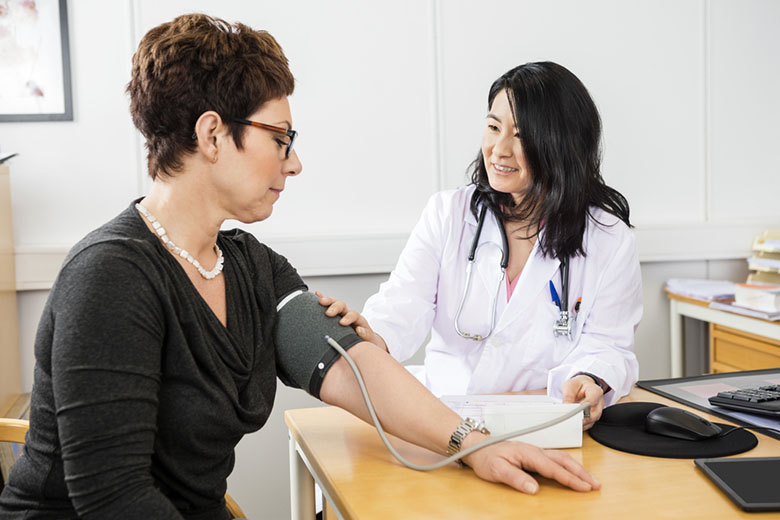High blood pressure, also known as hypertension, is a common condition that occurs when the force of blood against the walls of your arteries is consistently too high. If left untreated, this can lead to serious health problems, such as heart disease, stroke, and kidney failure.
For women going through menopause, high blood pressure can be particularly concerning. Hormonal changes during menopause can cause fluctuations in blood pressure levels and increase the risk of developing hypertension. Therefore, it’s important for women in menopause to monitor their blood pressure regularly and speak with their healthcare provider about any concerns they may have.
Let’s explore the link between menopause and high blood pressure in more detail.
How Menopause Puts Women at Risk for High Blood Pressure
During menopause, hormonal changes can significantly impact blood pressure levels. The decrease in estrogen production during menopause can cause the walls of blood vessels to become less flexible and more prone to constricting, leading to increased blood pressure. Additionally, the decline in estrogen levels can affect the body’s ability to regulate sodium and water retention, contributing to high blood pressure.
Other risk factors for developing high blood pressure during menopause include age, family history of hypertension, being overweight or obese, smoking, a sedentary lifestyle, and a diet high in salt and processed foods.
Click Here to Get Peace of Mind with Hormone Testing
Menopause Symptoms and High Blood Pressure
During menopause, hormonal imbalance symptoms in women may manifest as hot flashes, night sweats, mood changes, and difficulty sleeping. Fluctuations in hormones can lead to these symptoms which may cause unease and interfere with daily activities.
Unfortunately, some of these common menopause symptoms can also exacerbate high blood pressure. For example, hot flashes and night sweats can cause temporary spikes in blood pressure due to increased heart rate and blood vessel constriction. Mood changes like anxiety or stress can also contribute to high blood pressure levels. It’s important for women experiencing menopause to be aware of these potential triggers and take steps toward managing their symptoms through lifestyle changes or medication if necessary.
When to See a Doctor About High Blood Pressure During Menopause
If you’re experiencing high blood pressure during menopause, seeking medical attention is important. If left unaddressed, hypertension can result in health complications like heart ailments, kidney dysfunction, and stroke. Your doctor may recommend a combination of therapies to manage your blood pressure levels.
Solution 1: Hormone Replacement Therapy (HRT)
A potential treatment option for menopausal women with high blood pressure is hormone replacement therapy (HRT). HRT involves taking estrogen and progesterone hormones to alleviate symptoms associated with menopause. While there are potential risks associated with HRT, it may offer benefits for alleviating symptoms contributing to high blood pressure levels. It’s a good idea to discuss the potential benefits of hormone replacement therapy with a doctor to understand how this treatment option can help you.
Solution 2: Lifestyle Changes
In addition to HRT, lifestyle changes can also be effective in managing high blood pressure. Regular exercise, dietary changes such as reducing salt intake and increasing consumption of fruits and vegetables, and stress reduction techniques can all help lower blood pressure levels.
Solution 3: Medication
A final solution your doctor may suggest is medication. There are several types of medications commonly used to treat high blood pressure, including diuretics, ACE inhibitors, and calcium channel blockers. These medications work by reducing the amount of fluid in your blood vessels or relaxing the muscles in your blood vessel walls.
Click Here to Learn About Hormonal Imbalance Symptoms in Women
Managing High Blood Pressure During Menopause
It’s true that menopause can indeed cause high blood pressure due to hormonal changes and lifestyle factors. So it’s important to be aware of the potential risks associated with high blood pressure and to take steps to manage your blood pressure levels.
If you’re experiencing symptoms of high blood pressure during menopause, it’s crucial to seek medical attention from your doctor. Your doctor may recommend a combination of therapies, including medication, lifestyle changes, and hormone replacement therapy.
Ultimately, it’s important to prioritize your overall health during menopause and beyond. Don’t hesitate to talk to your doctor about any concerns regarding menopause or other health issues. By working together with your healthcare provider, you can take steps towards maintaining optimal health and wellness.

